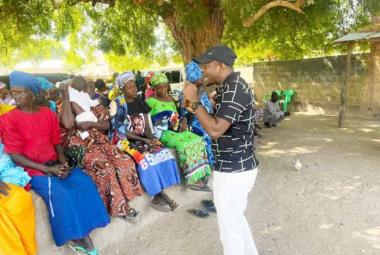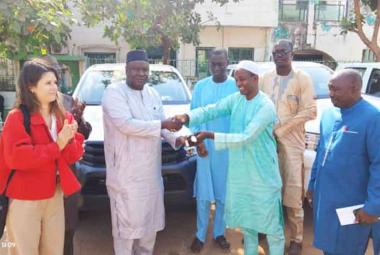The Permanent Secretary at the Ministry of Higher Education, Research, Science and Technology (MoHERST), Dr. Yusupha Touray, recently presided over the hybrid workshop on Science, Technology, and Innovation (STI) for SDGS Roadmaps in Africa project.
This collaborative event, hosted online in partnership with the European Commission, provided a platform for stakeholders from various government institutions and partners to convene and deliberate on the challenges, strategies, and recommendations for advancing Science and Technology in The Gambia.
In his address, Dr. Touray emphasised that the STI for SDGs Roadmaps in Africa project aims at strengthening STI capacities and building more inclusive and sustainable societies and he is optimistic that the meeting will create valuable thoughts and directions for the next in-country workshop and that the development of a roadmap on STI for SDGs will kick start.
Highlighting the significant progress achieved by MoHERST in implementing STI for SDGs in The Gambia, PS Touray underscored the Ministry’s role as the custodian of The Gambia’s National Science, Technology, and Innovation Policy (NSTIP, 2015-2024), following the widely adopted innovation systems approach.
Government, he affirmed, is poised and committed to building a critical mass of variable and competitive productive capacity in Science, Technology, and Innovation to achieve the structural transformation of its economy, as enshrined in the MoHERST Strategic Plan (2021-2025).
PS Touray concluded by encouraging the participants to discuss on leveraging the respective sectoral programs and priorities to enhance socio-economic development in The Gambia.
“Since the STI for SDGs project came at a time when the NSTIP (2015-2024) is about to phase out, and it will be good to leverage on the lessons, feedback and stakeholder insights of this STI for SDGs projects to path and guide the review of the policy in coming up with a successor that is responsive and in line with the MoHERST Strategic Plan and the prevailing NDP, as well as consistent with the UN-SDGs”.
It is worthy of noting that in line with the tertiary and higher education transformation agenda, research and technological development has been identified as critical enabler to the attainment of this policy drive, and as a country, there is great hope and potential to building such capacities to support sector development that will ensure the attainment of national development objectives. These include the establishment of the University of Applied Sciences, Engineering and Technology (USET), the TVET decentralization agenda, the establishment of the Gambia Research and Education Network (GAMREN), the development of a National Research and Innovation Fund (NaRDIF), and the various sectoral capacity development programmes being pursued by MoHERST are all aimed at strengthening the STI ecosystem.






